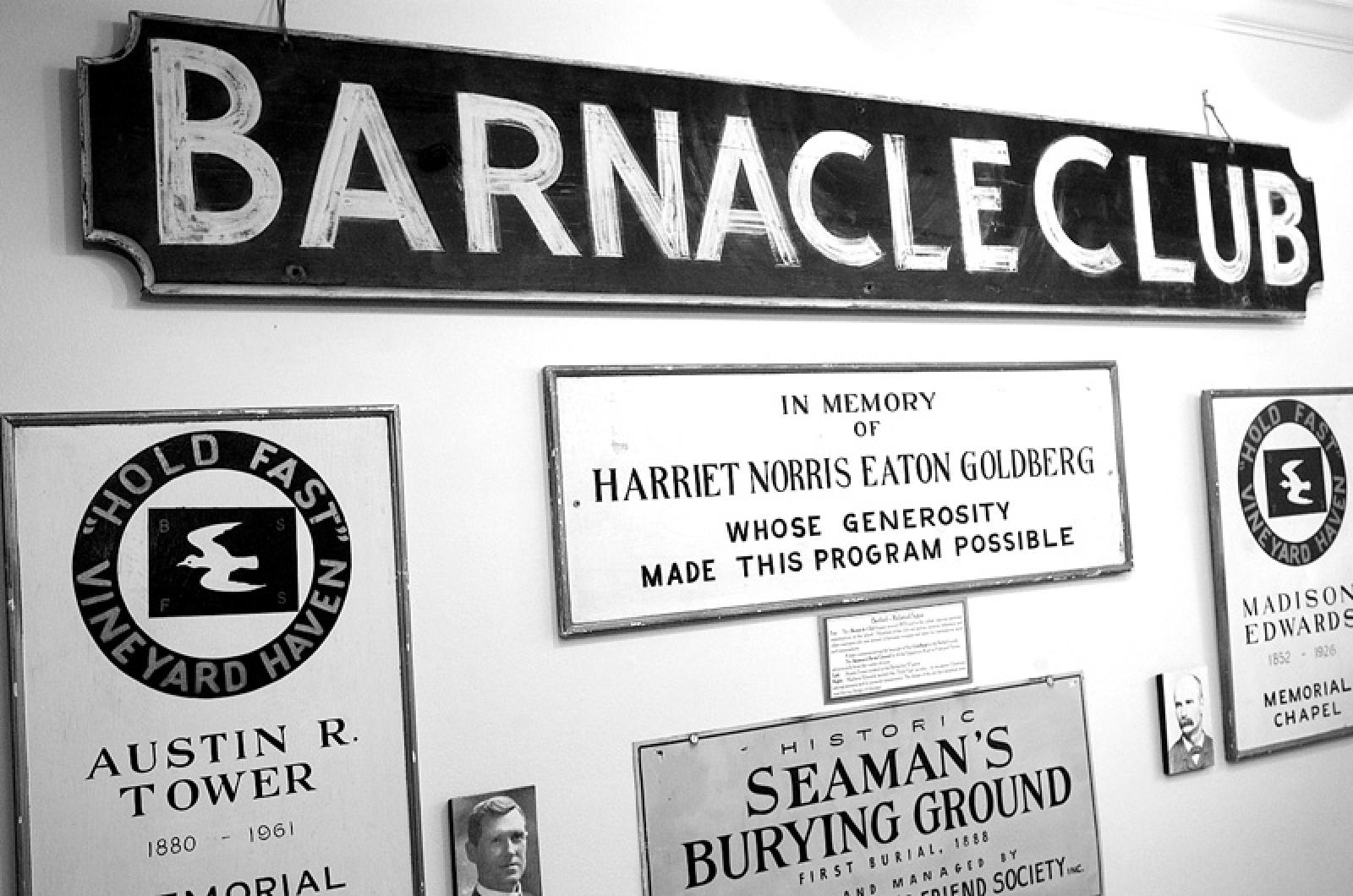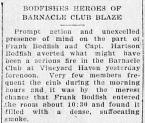From the March 3, 1939 edition of the Vineyard Gazette:
There are clubs, all good, some better and more decorative than others, but none just like the Barnacle Club of Vineyard Haven.
The club was originally composed of only men of the sea, as its name implies; pilots, coasters, whalemen, merchantmen, tugboat skippers, fishermen, all men who knew the way of the wind and tide. When the storms raged, and no duty called them forth, they gathered, to talk, to smoke, to play cards, curse the weather and in time, to reminisce.
The history of the Barnacle Club can be accounted for by informal record, and by reliable memories, for at least half a century. But its origin undoubtedly goes back much further than that. There was no actual club even then, just a group that met and loafed in Crowell’s coal office, then in Luce’s store, now Fischer’s on Union street; later, in the store of Matthew Chadwick, now the tailor shop of E. Issokson, where the first semblance of a club manifested itself. This consisted of an agreement with the proprietor to furnish the coal for heating the back room where the men gathered. This occurred in or about 1886, after the club had existed in an informal way for perhaps many years.
Eventually the club moved into the Castello building, now Cronig’s Market, and here it really began to assume the atmosphere of a bona fide club. In 1923, the building was purchased by the Cronig brothers, who opened their market there, and the club moved across the street into the Cromwell Block, where their quarters are now located.
In the days when the club occupied the Cronig building, with the collection of curios in the windows, many people were attracted by the display, which was unique indeed. And many and weird were the tales told of these relics. “Now here,” said Capt. George Fred Tilton, as he showed a relic to a visitor, “is a section of the mainstay of a ship. You will notice that it is broken, scarred, mangled and otherwise damaged,” and he pointed out the terrific mutilation of the mass of twisted wires. “A sailor had been to sea for all his life, and finally was beached because he was too old to perform his duty, Never having been able to get out of the fo’castle, he was enraged when he realized that his career was at an end, and that no prospects offered, that he seized this stay with his teeth and did this execution!” As a matter of fact, the relic was a section of telephone cable which had been riddled by a charge of shot when a boy shot at a crow perched upon it.
George W. Fisher of Edgartown was the first janitor of the club, and for many years held that position. He it was who collected the relics, fed the goldfish and alligators which were in the bowls and aquariums, and met the many visitors who used to venture in to find out just what kind of a place it was.
There was one very pompous summer visitor, a man who thought very well of himself and desired that no one else underrate his importance. Frequently he walked the street in the early morning and stopped to converse with Mr. Fisher as he cleaned up the club quarters. One morning he strolled into the club, in his nonchalant manner, and after a few preliminary remarks said: “Ahem, I think I would like to become a member of your club, Mr. Fisher.”
The long-suffering janitor straightened up and replied: “There’s a hell of a lot more who would too!”
For reasons that are perfectly obvious to older generations, the average summer visitor was held in a certain amount of awe by the average native son. The fact that a man possessed sufficient wealth to allow him to loaf all summer when the average man had to work doubly hard, was enough in itself to command a certain respect not unmingled with envy.
But somehow the mark of caste, whatever it may consist of in other surroundings, seems to have been entirely forgotten or totally ignored within the Barnacle Club. Men of every social station meet and mingle there, and so long as their respectability is assured, nothing further is desired. The man who labors with his hands for a livelihood sits in a game of cards with the man of extreme wealth; the laborer and the scholar mingle in a similar manner, and “it is good to see how brothers dwell together in unity.”
What the future of the Barnacle Club may be, no one can foretell. It may vanish from the face of the earth in time, or develop into a gilded establishment in which its founders would have become dazed and indignant. But whatever may come, future generations may find in this record a fragment of information which will give them just a glimpse of the picture that this unique organization presented when it was composed of the native Vineyard sons who earned the right to be known as barnacles before they could be admitted to membership.
Compiled by Hilary Wall
library@mvgazette.com







Comments (2)
Comments
Comment policy »